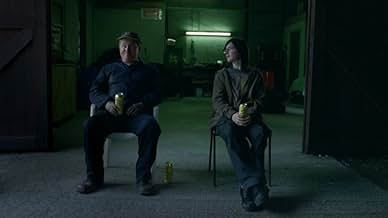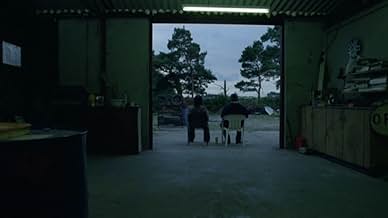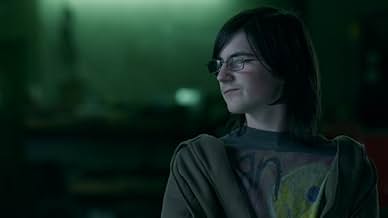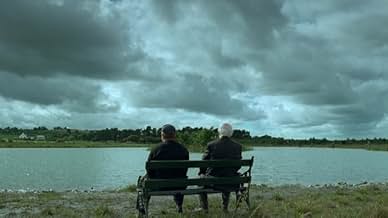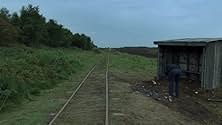Garage
- 2007
- 1 h 25 min
AVALIAÇÃO DA IMDb
7,1/10
3,2 mil
SUA AVALIAÇÃO
Adicionar um enredo no seu idiomaA tragicomedy set in the world of gas stations in rural Ireland, where over-diligent employee of the garage searches for intimacy during the course of a life-changing summer.A tragicomedy set in the world of gas stations in rural Ireland, where over-diligent employee of the garage searches for intimacy during the course of a life-changing summer.A tragicomedy set in the world of gas stations in rural Ireland, where over-diligent employee of the garage searches for intimacy during the course of a life-changing summer.
- Prêmios
- 12 vitórias e 14 indicações no total
Avaliações em destaque
Believe me this is the most slow paced, void of dialog, boring independent-ish film I've ever seen. It makes Sling Blade look like an action flick. I was watching it to fight off insomnia one late night. Unfortunately it didn't work because after sticking with it to the end I was blown away by how the depiction of desolate rural Ireland life actually drove the story and gave deep meaning to the unbelievable end.
So don't get discouraged and grab that remote because you're so bored with this movie you just can't watch another minute because the deadpan, eventless story line really does say something about our society and modern life in a way that creeps up on you and slaps you in the face and makes you think.
So don't get discouraged and grab that remote because you're so bored with this movie you just can't watch another minute because the deadpan, eventless story line really does say something about our society and modern life in a way that creeps up on you and slaps you in the face and makes you think.
Josie has been assigned the roles in life of pumping petrol and being the village idiot. He qualifies for the former role by being loyal to his boss, diligent about his work tasks, and friendly to the customers. He qualifies for the latter role because of some sort of mild mental disability that makes him slow to process ideas and not too good at standing up for himself. In fact he's not that stupid - one gets the impression that he was a slow child whom people got into the habit of talking down to, but that he understands more than other people acknowledge or that he even acknowledges himself.
People like Josie are litmus tests for distinguishing bullies from people who are fundamentally decent. The bullies, both teenagers and adults, treat him as if he doesn't even understand the cruel remarks they direct towards him. The people of conscience don't mock him because they know he can't respond in kind, and they recognise that he is capable of being hurt. However their kindness can only go so far: they can't engage with Josie as equals, they can't talk to him about relationships or children or careers, and the weather and the news of the town provide only a minute or two of conversational material.
Even more uncomfortable to watch than his treatment by the bullies is the use people make of him as a confidant of last resort. They unburden their hearts to him in the assumption that he has nothing better to do than listen to them, and expecting from him the kind of unconditional sympathy one would get from a pet dog. There is no reciprocation, nobody asks him how he is getting on, so Josie's unhappiness remains unarticulated beneath the conventional cheeriness that he presents to the world and the world expects of him.
The action of this slow moving film can be said to be driven by the intrusions of the wider world into a rural community. Josie's livelihood is threatened by economic development, and his role as the village idiot is threatened, if that's an appropriate word, by the dilution of the community with "blow ins". Being a village idiot is a cruel and marginal existence for Josie, but it does mean that when he takes a wrong turn, people have a ready explanation for his actions, and can be quite tactful and kind in nudging him back in the right direction. When the village fills up with more and more people who haven't known Josie since birth, his behaviour is in danger of being interpreted in a different way.
People like Josie are litmus tests for distinguishing bullies from people who are fundamentally decent. The bullies, both teenagers and adults, treat him as if he doesn't even understand the cruel remarks they direct towards him. The people of conscience don't mock him because they know he can't respond in kind, and they recognise that he is capable of being hurt. However their kindness can only go so far: they can't engage with Josie as equals, they can't talk to him about relationships or children or careers, and the weather and the news of the town provide only a minute or two of conversational material.
Even more uncomfortable to watch than his treatment by the bullies is the use people make of him as a confidant of last resort. They unburden their hearts to him in the assumption that he has nothing better to do than listen to them, and expecting from him the kind of unconditional sympathy one would get from a pet dog. There is no reciprocation, nobody asks him how he is getting on, so Josie's unhappiness remains unarticulated beneath the conventional cheeriness that he presents to the world and the world expects of him.
The action of this slow moving film can be said to be driven by the intrusions of the wider world into a rural community. Josie's livelihood is threatened by economic development, and his role as the village idiot is threatened, if that's an appropriate word, by the dilution of the community with "blow ins". Being a village idiot is a cruel and marginal existence for Josie, but it does mean that when he takes a wrong turn, people have a ready explanation for his actions, and can be quite tactful and kind in nudging him back in the right direction. When the village fills up with more and more people who haven't known Josie since birth, his behaviour is in danger of being interpreted in a different way.
Here we have a real rarity. An Irish film that really evidences an understanding of the place of film grammar in the art of the cinema. This rural tragi-comedy looks at a very uncomfortable sliver of the human condition.
It is, largely, about the way that the complexities of modern life can render the simple-minded tragically vulnerable. Under normal circumstances I hate - indeed loathe - films that 'overtly' mimic the works of dwarfingly great film makers. I am not sure that Abrahamson (the director) actually sought to mimic the wonderful, indeed sublime cinema of Robert Bresson, but I am sure that that is exactly what comes to mind when the film is watched. Thematically, it has much in common with 'Mouchette' (not best Bresson, but very good Bresson!). Stylistically, it resembles parts of 'L'Argent'! That the above is the case and it still grips and appeals is a great credit to the film makers. But it is not completely 'echt' of course. There are parts of Bresson's magisterial style (his use of close ups, and his total command of sound for example) that are largely missing, but, make no mistake, this is a wonderful piece of cinema.
At the centre of it is the character of Josie, a harmless simpleton, whose guileless sincerity leads him to be the butt of the cruel humour of the would-be sophisticates with whom he shares parts of his rural existence. But fate has an even crueller plan for Josie.
Effortlessly characterised by comedian Pat Shortt, the director's unflinching gaze shows Josie's blameless naiveté in heart-rending detail - his loneliness, his pain at the cruel jibes and his unreasoned optimism.
I really hate the style of cinema that seeks to drag its audience into a slough of despond, but though tragic, 'Garage' doesn't do that, because it retains its clear belief in cinema and its potential to lift the human spirit to undreamed of heights.
It is, largely, about the way that the complexities of modern life can render the simple-minded tragically vulnerable. Under normal circumstances I hate - indeed loathe - films that 'overtly' mimic the works of dwarfingly great film makers. I am not sure that Abrahamson (the director) actually sought to mimic the wonderful, indeed sublime cinema of Robert Bresson, but I am sure that that is exactly what comes to mind when the film is watched. Thematically, it has much in common with 'Mouchette' (not best Bresson, but very good Bresson!). Stylistically, it resembles parts of 'L'Argent'! That the above is the case and it still grips and appeals is a great credit to the film makers. But it is not completely 'echt' of course. There are parts of Bresson's magisterial style (his use of close ups, and his total command of sound for example) that are largely missing, but, make no mistake, this is a wonderful piece of cinema.
At the centre of it is the character of Josie, a harmless simpleton, whose guileless sincerity leads him to be the butt of the cruel humour of the would-be sophisticates with whom he shares parts of his rural existence. But fate has an even crueller plan for Josie.
Effortlessly characterised by comedian Pat Shortt, the director's unflinching gaze shows Josie's blameless naiveté in heart-rending detail - his loneliness, his pain at the cruel jibes and his unreasoned optimism.
I really hate the style of cinema that seeks to drag its audience into a slough of despond, but though tragic, 'Garage' doesn't do that, because it retains its clear belief in cinema and its potential to lift the human spirit to undreamed of heights.
Josie works in a garage in a small town. He mans the gas pumps, sells the oils and the magazines to the travelers. Only, the town is so small and the road is so little traveled that he hardly has anything to do. Josie has also lived in this town all his life and has worked in this same garage for almost just as long. When his boss asks him to take on the weekends as well he is up for the task - and when his boss offers to send a kid as a helping hand he accepts that kid too. All in all, Josie is a very easy guy that takes the world for what it is. Too bad the world does not fully understand that.
Although somewhat predictable this film is a rather interesting one. The way the actors play out their roles make up for a glimpse of the grim reality people like Josie live in. All he wants is do good, all he gets is evil. The message is clear from the very start of the film but never starts to bore too much. This is purely due to the way the different characters get together and depict the pretty little village the film plays in - the message fits the persons and the town perfectly. When the ending comes it is dark and dreary, but fitting and only logical.
9 out of 10 good people making bad choices
Although somewhat predictable this film is a rather interesting one. The way the actors play out their roles make up for a glimpse of the grim reality people like Josie live in. All he wants is do good, all he gets is evil. The message is clear from the very start of the film but never starts to bore too much. This is purely due to the way the different characters get together and depict the pretty little village the film plays in - the message fits the persons and the town perfectly. When the ending comes it is dark and dreary, but fitting and only logical.
9 out of 10 good people making bad choices
Garage arrives at a great time for Irish cinema. The output and standard of Irish film is at an all time low with an exception like Adam and Paul, a film from the same people that made Garage. Writer Mark O Halloran is a sure hand at capturing the subtle nuances of everyday Irish life. In his previous outing Adam and Paul he delved in to the world of two strung out Dublin heroin addicts. In Garage we join Josie in his hum drum existence as a petrol station attendant in a nameless provincial Irish village. Josie is not the sharpest tool in the box but his cheery demeanor aids the viewer in being won over by him.
Pat Short in his first dramatic role subverts his usual comic representation of the country redneck by infusing his portrayal of Josie with great pathos and genuine humor. Short has altered his stride in more ways than one here, totally changing his gait and physicality to become the character of Josie. It is an excellent performance from Short and as an Irish man who has been exposed to his previous life as simply a comic performer, a revelation.
Leonard Abrahamson who also directed Adam and Paul has made a film that is visually beautiful. The local shop, the quiet village street and the starkly beautiful Irish countryside punctuate the film creating a strong sense of place for the audience. These also serve to bring us in to the numbing routine of Josie's daily existence. He lives in terrible conditions but he blames no one and trudges on until closing time each day. Abrahamson revels in the everyday and the ordinary in Garage. Two men smoking outside a pub, a shop worker chatting to Josie outside her shop; these everyday scenes are woven in to the tapestry of Garage and in turn made in to something extraordinary.
Garage is a wonderful movie. Abrahamson as director and O Halloran as writer have made the best two Irish films of the last ten years in 'Adam and Paul' and 'Garage'. Finally I would just like to mention the great Tom Murphy who co starred in Adam and Paul as he just recently passed away. He will be sorely missed.
Pat Short in his first dramatic role subverts his usual comic representation of the country redneck by infusing his portrayal of Josie with great pathos and genuine humor. Short has altered his stride in more ways than one here, totally changing his gait and physicality to become the character of Josie. It is an excellent performance from Short and as an Irish man who has been exposed to his previous life as simply a comic performer, a revelation.
Leonard Abrahamson who also directed Adam and Paul has made a film that is visually beautiful. The local shop, the quiet village street and the starkly beautiful Irish countryside punctuate the film creating a strong sense of place for the audience. These also serve to bring us in to the numbing routine of Josie's daily existence. He lives in terrible conditions but he blames no one and trudges on until closing time each day. Abrahamson revels in the everyday and the ordinary in Garage. Two men smoking outside a pub, a shop worker chatting to Josie outside her shop; these everyday scenes are woven in to the tapestry of Garage and in turn made in to something extraordinary.
Garage is a wonderful movie. Abrahamson as director and O Halloran as writer have made the best two Irish films of the last ten years in 'Adam and Paul' and 'Garage'. Finally I would just like to mention the great Tom Murphy who co starred in Adam and Paul as he just recently passed away. He will be sorely missed.
Você sabia?
- CuriosidadesThe reason why this film received the highest UK cinema rating - 18 - is entirely due to the close-up of the porn video that Josie receives from a van driver.
- Erros de gravaçãoWhen Carmel offers Josie a bag for his shopping, she gives him a plastic bag, but does not charge him the 22c plastic bag levy in place in Ireland. This was probably a kindness on her part.
- ConexõesFeatures The Affair (2006)
- Trilhas sonorasRide On
written by Jimmy MacCarthy
published by Universal Music Publishing Ltd.
background music in the pub
Principais escolhas
Faça login para avaliar e ver a lista de recomendações personalizadas
- How long is Garage?Fornecido pela Alexa
Detalhes
- Data de lançamento
- País de origem
- Centrais de atendimento oficiais
- Idioma
- Também conhecido como
- Garaje
- Locações de filme
- Empresas de produção
- Consulte mais créditos da empresa na IMDbPro
Bilheteria
- Faturamento bruto mundial
- US$ 972.491
- Tempo de duração1 hora 25 minutos
- Cor
- Proporção
- 1.85 : 1
Contribua para esta página
Sugerir uma alteração ou adicionar conteúdo ausente


